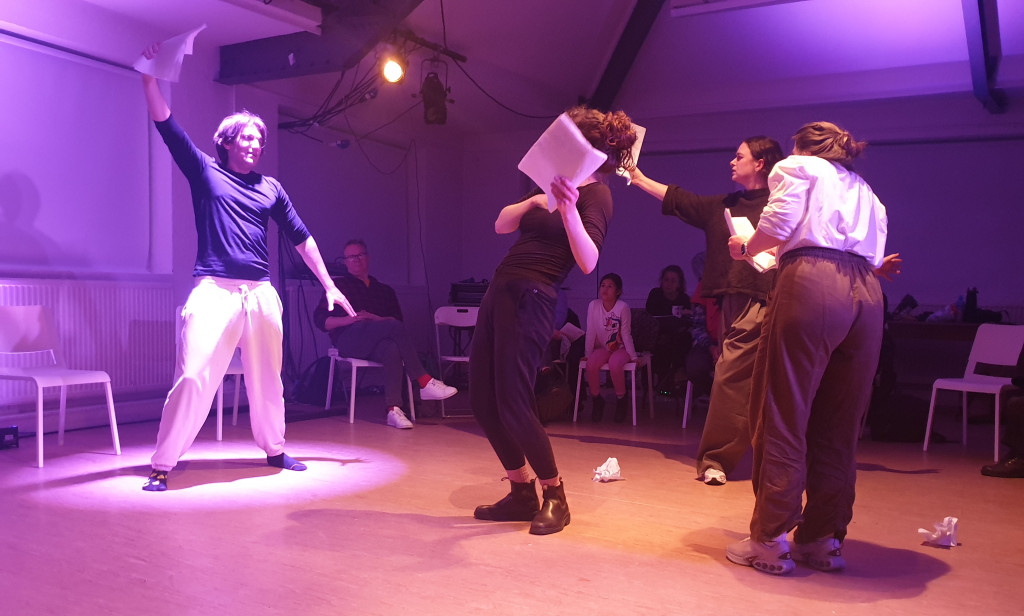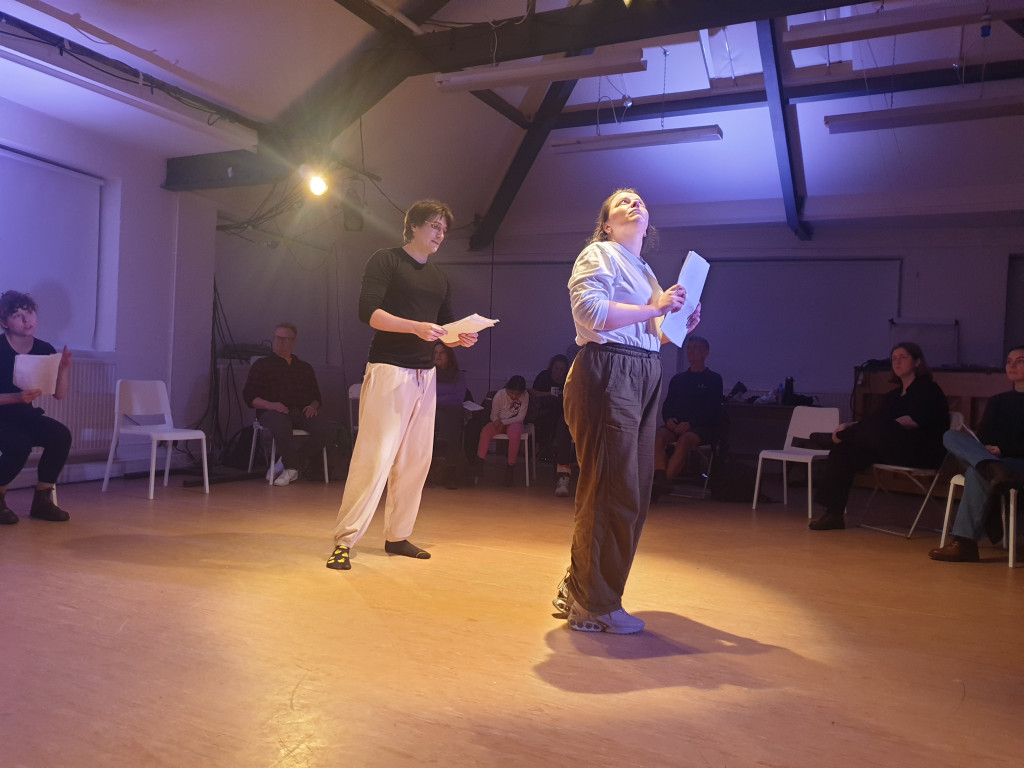Mothertongue’s Cecilia Thoden Van Velzen talks us through her creative process.

Hello to everyone reading, and welcome back to not only week 2 of the ‘MAKE SPACE!’ festival, but also week 2 of our series where I interview the artists and dive into their practice.
In case you’re wondering who I am, my name is Gina, the current Writer in Residence at London Bubble. I’m currently perusing a degree at The Royal Central School of Speech and Drama, but during this time, I’m planning on continuing not only the interview series but also am planning on lots more exciting content about the festival and Bubble over the coming weeks.
But that’s enough about me, I think it’s time we made some space for Cecilia! (I’ll be here all night.)
Cecilia Thoden van Velzen (She/Her) is a theatremaker, writer and composer. Her work is often focused on the unseen and the unbelonged and varies from musical theatre and opera to puppetry performance and dance. Cecilia is dedicated to making theatre more accessible and inclusive, especially for neurodiverse and disabled audiences.
When I sat down to interview Cecilia, it was after a very crazy and intensely energetic morning workshop with 6–11-year-olds. When I came to talk to her, she was already creating mind maps from all the wacky and wonderful inspiration that they brought her.
“You’re always working through other people’s eyes” she comments on creating for children. “The hardest thing is not being your own target audience, but that’s also the fun part.”
With ‘Mothertongue’ being our only children’s show at ‘MAKE SPACE!’, Cecila speaks openly about the difference in the creative process when it comes to writing for the next generation.
“There are so many grown-ups who say everything looks nice and is brilliant when it really isn’t. So, I think you get better theatre at the end of the day, because it’s brutally honest.”
In 2019, ‘The Stage’ reported that children’s theatre engagement was falling faster than any other creative activity they may engage in, and undoubtedly, this has continued to be a trend since the pandemic. This has overlooked effects on the development of children’s imagination and creative thinking. With a lack of children’s plays emerging today, how do the next generation of theatre makers aim to tackle the problem? Cecilia has some ideas, especially regarding where she plans to take ‘Mothertongue’ in the future.
“I think stories can be told anywhere. Anywhere where they have an audience of young people, schools, after school clubs. I don’t think being in a theatre often provides the right audience for the work, I think sometimes you just have to take the work and go to the people. I’d like this production eventually to be super moveable. In schools, in theatres, in forests.”
There was certainly a theme prevalent in both my conversation with Cecilia, and in ‘Mothertongue’ itself, a championing of the unconventional and a steady determination to do things differently in a world that pedestals the idea of ‘a norm’. All the more fitting, because ‘Mothertongue’ itself is a foray into a fairytale world.
The story follows Cleo, a young girl who one day goes non-verbal at a hectic family dinner. Tired of the questioning and harassment from her family about this, she travels into a fairytale forest of her own invention to find the language troll, ‘Mothertongue’, who she hopes will help her.

Cecila, who grew up roaming forests and listening to the grizzly tales of brother’s Grimm, describes her decision to frame a child’s struggle with the ‘norm’ with fantastical elements:
“When I was a kid, if I had to sort out bigger problems, I’d do it in my own head, far away from everyone else and everyone else’s opinions. I think it’s only natural, if the problems are large enough to look for an escape and look for a world in which the problems take different shapes like creatures, and trees, and so they become something you can deal with, instead of something intangible.”
In ‘Mothertongue’, all is not as it seems. Maybe you readers feel you understand what language is. It is what you learned in primary school, sounding out vowels and verbs, it is what you got your handwriting license for, maybe. It is what you got marked on time and time again. Maybe you were someone the pursuit of “perfect” language did not come naturally to.
“I describe her as the keeper of all language. Someone who lives in the middle of this wood, and the wood is ‘talking’ and communication in all sorts of different ways. Mothertongue is responsible and in charge of how it functions. She controls and leads all communication.”
While the titular character, the troll Mothertongue, represents all language, it is not the language that you learned there was a right and wrong for in school. Cecilia speaks of something more universal that has somehow been lost in translation in our classrooms.
“This is not my first language. I have days where I struggle with language. I think there’s a lot of pressure around language, to me it’s important to tell stories that have a message of (…) it doesn’t have to be perfect. The way you use words doesn’t have to be perfect.”
“People are very harsh, and judge people who don’t use words or traditional language. I would very much like to see a world in which we learn how to listen a little bit more than we speak. Kids are tested on their language abilities. They need to learn how to accept themselves if that’s not their strongest ability.”
Representation is important, that’s no secret, and representation is something we always root for and advocate for at Bubble. Cecilia also knows the importance of having a cast who can do a play that deals with specific themes justice. As she put it in our first ever meeting “This play features a neurodivergent cast, for a neurodivergent show.”
“It’s something that’s happening a lot more and more, shows where neurodivergent themes are being represented. But I also think it’s important that representation is occurring inside rehearsal spaces. I think my way of working as a neuro divergent person is very different. I’d rather figure it out on my feet, with people in a space through sounds and sensory stuff. It’s important to create a rehearsal space in which the actors feel they can fully be themselves and be creative in a way that suits them.”
Oh, and if you can’t get enough of ‘Mothertongue’s otherworldly concept, just check out this fun little play on words Cecilia has in store:
“I’ve invented a term called otherwordiness– making up your own language, using words that maybe don’t make sense but we all know what it means. I think they’ll be a language based around that that will be devised.
And what else?
“There will be communicating purely around sound, but also smell and movement. I’d like to deconstruct language as a thing based around words, I think communication is a lot bigger.”
I personally can’t wait to take a trip into this mystical forest, and I’m sure you can’t either. If you want to support the amazing Cecilia and her cast, please grab your FREE tickets linked on our website here. Please, bring either your children if you have them, or your inner child if you’re child free. ‘Mothertongue’ will be performed at 7:30pm on Friday the 1st of November at London Bubble Theatre, 3-5 Elephant Lane, SE16 4JD, and our space is fully accessible for those that use a wheelchair or have other accessibility needs.
We can’t wait to see your faces and invite you into the mythical world of ‘Mothertongue’.
London Bubble, signing off.
FREE tickets for ‘Mothertongue’ here
Click here to read more about our ‘MAKE SPACE!’ sharings!
Click here to find out more about our mission at London Bubble.
